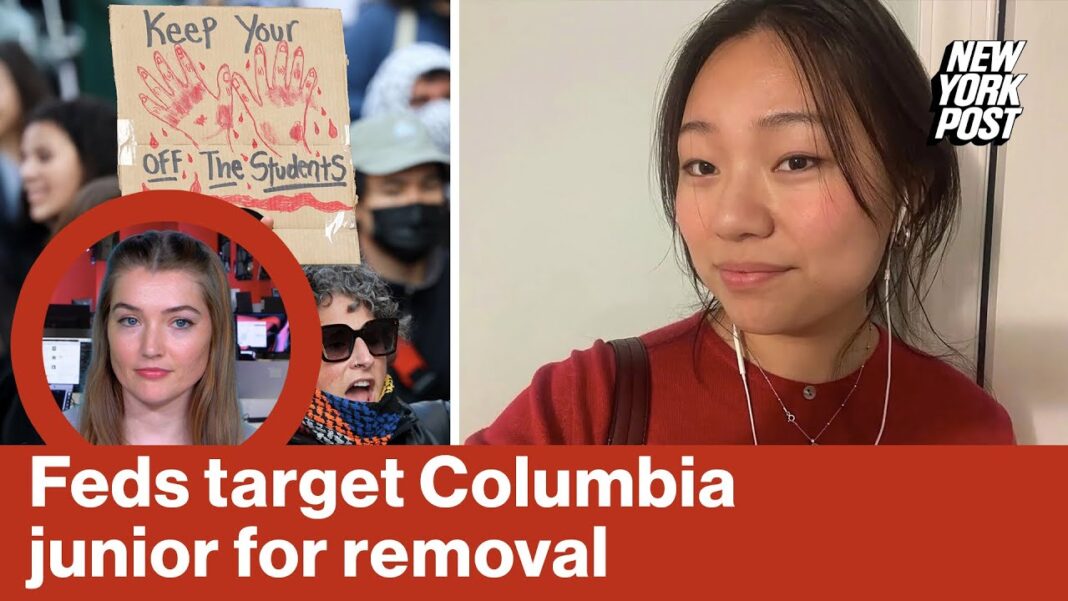|
Getting your Trinity Audio player ready...
|
Columbia Student Facing Deportation After Pro-Hamas Protest Arrest: DHS Cites “Concerning Conduct”
By: Fern Sidman
The immigration case of Yunseo Chung, a 21-year-old Columbia University junior and women’s studies major, has sparked national attention and renewed debate over the intersection of free speech, immigration law, and political activism. As reported by The New York Post on Tuesday, Chung—who immigrated to the United States from South Korea as a child and is a permanent U.S. resident—is now facing deportation proceedings initiated under the Trump administration, despite her recent legal efforts to block the move.
But it is not just her immigration status that is drawing headlines. The Department of Homeland Security (DHS) has publicly cited “concerning conduct”, specifically pointing to Chung’s arrest on March 5 during a pro-Hamas demonstration held at Barnard College, as a factor in the proceedings.
According to the information provided in The New York Post report, Chung was arrested by the NYPD during a sit-in protest at Barnard that followed the expulsion of two students who had previously stormed into a Columbia University classroom on modern Israel and distributed antisemitic flyers. The March protest, organized in support of those expelled students, drew criticism for promoting pro-Hamas messaging, with DHS spokeswoman Tricia McLaughlin explicitly referencing this context in her comments to the press.
“Yunseo Chung has engaged in concerning conduct, including when she was arrested by NYPD during a pro-Hamas protest at Barnard College,” McLaughlin said in a statement provided to The New York Post.
Chung was charged with obstructing governmental administration and issued a desk appearance ticket, a relatively minor form of processing by the NYPD, but one that nonetheless carries legal weight.
While Chung is not currently in federal custody, she is actively being sought for removal proceedings, according to DHS. McLaughlin further confirmed to The New York Post that Chung will have the opportunity to present her case before an immigration judge, in keeping with due process under U.S. immigration law.
The timing and context of the deportation effort, however, has prompted outrage from Chung’s legal team, who argue that the action is politically motivated and designed to suppress dissent.
“The government’s retaliation against Ms. Chung comes in a broader context of retaliation against other noncitizens who have exercised their First Amendment rights,” her attorneys said in a public statement, as reported by The New York Post. They assert that the Trump-era immigration initiative targeting Chung aims to “chill” protected free speech, particularly activism critical of U.S. foreign policy and Israel.
Chung is not just a political activist but a high-achieving student whose academic and extracurricular background stands in contrast to the controversy she now finds herself embroiled in. As noted in The New York Post report, she was valedictorian of her high school class and serves as the social media editor for Quarto, Columbia University’s official undergraduate literary magazine. Her case, therefore, illustrates a broader tension between civic activism and the precarious status of noncitizen residents in politically charged times.
The protest in which Chung was arrested has itself become a lightning rod in the ongoing national debate about rising antisemitism on U.S. college campuses, especially in the wake of the October 7 Hamas terrorist attack in Israel. With students increasingly divided—and vocal—on the Israeli-Palestinian conflict, Columbia and Barnard have become key battlegrounds in this ideological war. DHS’s decision to publicly link Chung’s deportation proceedings to her involvement in a pro-Hamas demonstration will almost certainly intensify scrutiny on the university, federal authorities, and campus activists alike.
Chung’s legal challenge could become a landmark case in testing the limits of free speech protections for noncitizens, especially as it pertains to controversial political demonstrations. If DHS proceeds with deportation and the courts reject her lawsuit, the case may set a precedent for how immigration law intersects with civil liberties in the United States.




